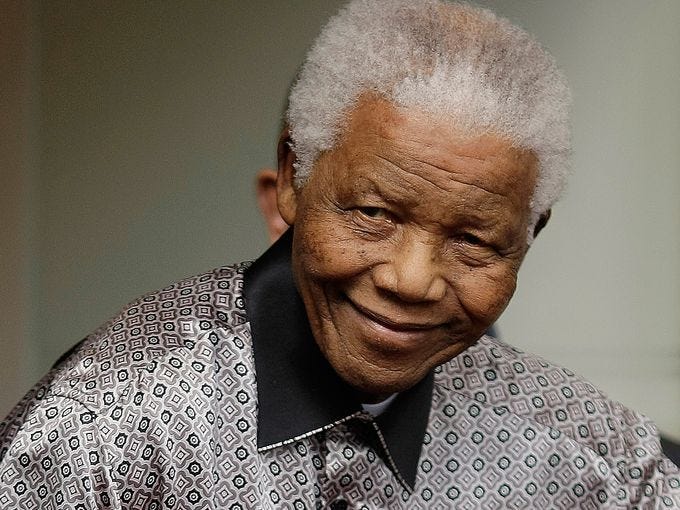Ahmed Kathrada, a warhorse of the anti-apartheid
struggle, was allowed just a few minutes at the hospital bedside of his
critically ill comrade, Nelson Mandela. It was, he said, a traumatic
experience to see the former president, physically robust during their
prison years together, in such a fragile state.
Mandela could not
speak but his face "changed" and he recognized his visitor "through his
eyes," Kathrada said of the July 1 encounter, which was overseen
protectively by Mandela's wife, Graca Machel.
This is the image of
Mandela that South Africans, and many people around the world, find
hard to accept. The man who withstood 27 years in jail and led his
country from conflict toward reconciliation, is as vulnerable as anyone
his age, and monitored around the clock by doctors.
The
94-year-old was admitted to a Pretoria hospital on June 8 for a lung
infection. The government said Thursday he is in critical but stable
condition, and responding to treatment. Legal filings by Mandela's
family have said he is on life support.
"All the years that we
knew him, we knew him, somebody who was very conscious of his health,
somebody who exercised in and outside of jail, regularly, and here you
see a person who's different. A shell of himself," Kathrada, 83, said in
an interview Wednesday with The Associated Press.
"It was an
overwhelming feeling of sadness, and of course the unrealistic wish and
prayer that he can be with us for longer and longer," said Kathrada, who
joined Mandela in pivotal events of the early campaign against minority
white rule. The two first met in 1946, before apartheid was even
implemented.
Thursday marked the 50th anniversary of the 1963 raid
on the Liliesleaf farm in Johannesburg that netted most leaders of the
African National Congress, then a liberation movement and now South
Africa's ruling party. Kathrada was among those arrested there, while
Mandela was already in prison at that time.
Then followed the
"Rivonia" trial at which Mandela, accused of sabotage and plotting to
overthrow the government, declared that he was prepared to die, if
necessary, for his belief in racial equality. He, Kathrada and others
were sentenced to life in prison and sent to Robben Island, near Cape
Town.
"He was a boxer, he was a gymnast, he was a very strong
person," Kathrada, a member of parliament after apartheid, said of
Mandela. "In prison too, when we were working at the quarry with pick
and shovels, we found difficulty... but he was strong enough to adjust
to that quickly."
He described Machel as a gatekeeper who makes
sure visitors, including relatives, old friends and President Jacob
Zuma, don't stay too long during trips to see her frail spouse. Her
first husband, Mozambican President Samora Machel, died in a plane crash
in 1986.
Human rights lawyer George Bizos, a member of the legal
team that defended Mandela and others at the Rivonia trial, said Machel
invited him to see Mandela in the hospital last month. The visit was
canceled when the health of his friend deteriorated.
"None of us
are immortal, but I can't really come to terms that he may pass away in
the near future," Bizos said in a telephone interview.
He recalled
a visit to Mandela in Johannesburg a week before the hospitalization at
which the two men, along with Machel, chatted about "many things" for
more than half an hour, including talk of their days together as law
students in Johannesburg.
"He would ask me, 'Do you remember
'so-and-so,' is he still around? When did you last see him?'" Bizos
said. Mandela sometimes repeated questions, like many elderly people
whose minds are no longer sharp.
"They may not remember what they said 10 minutes before, but they remember what happened 50 years ago," he said.
Yet
Mandela still had caring instincts. Bizos had left his jacket in his
car, but Mandela thought he had taken it off in the house.
"'George, don't leave your jacket behind,'" he fondly instructed Bizos on that South African winter's day.
Memories
pervade Kathrada's apartment in Johannesburg, where a framed prison
dish hangs on the wall. It was a birthday gift in 1999 from Mandela,
whose inscription reads: "To Kathy, Best wishes to a remarkable
comrade."
A large photograph of the two men hangs in the foyer. Both are smiling broadly, and Mandela has his hand on Kathrada's knee.
Prior
to last week's visit, Kathrada last saw Mandela in September in his
rural home in Eastern Cape province, shortly before the former president
was moved to the Pretoria-Johannesburg area for the first in a series
of hospital stays.
Kathrada brought an album of photographs from
Kazakhstan, where he had traveled for events held to honor Mandela's
ideals on July 18, the beloved figure's birthday. The photographs showed
children who had drawn images of Mandela or the South African flag with
crayons on the ground.
"We went for lunch, while he stayed," Kathrada said. "And when we came back from lunch, he was still paging through this album."
